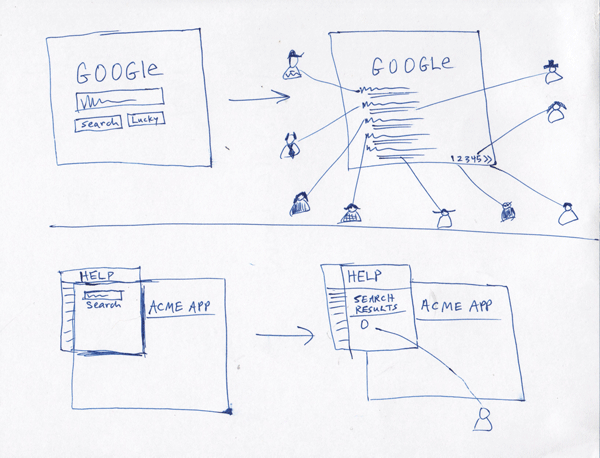The Real Source of Findability
I was talking to a colleague today about wikis when he mentioned Google, and how Google has such a brilliantly simple solution that allows users to find content. With Google, there's a search box. The users type keywords they want information about, and most of the time Google returns brilliantly relevant results.
While some credit is certainly due to Google's Pagerank algorithm, what enables findability in Google is that there's so much content on the web to find. If you have billions of web pages, of course the search engine is going to come up with results that match almost any keywords you enter. As a result, because of the mass of content, you have instant findability. Take away the content, leave only the algorithm, and you have nothing.

How much of that content is Google generating itself? Almost none of it. The web is like a giant wiki, where anyone can author and publish content. Only instead of adding new wiki pages, we're all adding our own sites and pages on our sites.
I brought this up as a colleague and I were discussing our organization's external wiki, tech.lds.org. It's a wiki that has quietly been growing in size each day, used for myriad purposes both internally and externally. You can do a search on quite a few topics and pull up content -- because so many people are authoring. There are probably more than 20 regular authors contributing to that site, with probably 30+ daily edits. When you have so many authors producing content, the result is that someone is going to address a problem that another is searching for. The answers are findable.
The paradigm of a single author controlling all the content for a knowledge domain -- keeping it in a tightly structured environment that moves through a strict editorial process -- is a model that, no matter how well organized or planned out, will probably fail when it comes to findability precisely because you only have one person creating the content. That one person is inevitably trapped by his or her own experiences, by his or her limited domain and restricted viewpoint, by his or her job role and title. There's no way a single person can produce the mass of content necessary to enable findability on a wide scale. The person will produce 100 single-focused pages compared to the 10,000 multi-faceted pages produced by an army of authors.
The intelligence of the web isn't the technical infrastructure or the idea of bandwidth or CSS. Its intelligence comes because so many people contribute content. It's the true global encyclopedia -- Wikipedia is just one part of a larger body of reference information. We're all contributing to it, page by page.
We're only about 15 years into this endeavor. Imagine the size of the content repository in 50 years. We're moving towards a book of knowledge that is growing daily, becoming more and more comprehensive -- and it's because of the individual contributions, not because of a specific authoring tool or process or technology.
It's a free for all, sure, with any kind of design, format, and style. But despite the variances, people look past design and focus on content. This is why, when we consider enterprise authoring methodologies, what makes the most sense is the authoring methodology that empowers the most people to author.
As more people author, the pool of content grows wider and deeper. Soon you'll amass enough information that, although it's a content dumpyard in many cases, when users dig around they find the nuggets of information they're looking for. It's not a huge problem if the individual content on each page or project varies in layout, color, and style. The mere fact that the content is there, because you empowered a subject matter expert or user to author it, means that you have content. Content exists. This content gives rise to findability.
Although I have looked at many authoring tools, I think the one that triumps them all is the wiki, precisely because it enables the enterprise to author content. Many times the authoring is stifled and only a fraction of what it could be, but other times large numbers of contributors jump in and author. They produce loads of content. When this happens, the result is something far greater than any single authoring team alone can produce.
In short, findability isn't enabled by some clever organizational technique such as tagging or faceted browsing or even schema theory. Findability is enabled by empowering all humans to share and publish their knowledge.
About Tom Johnson

I'm an API technical writer based in the Seattle area. On this blog, I write about topics related to technical writing and communication — such as software documentation, API documentation, AI, information architecture, content strategy, writing processes, plain language, tech comm careers, and more. Check out my API documentation course if you're looking for more info about documenting APIs. Or see my posts on AI and AI course section for more on the latest in AI and tech comm.
If you're a technical writer and want to keep on top of the latest trends in the tech comm, be sure to subscribe to email updates below. You can also learn more about me or contact me. Finally, note that the opinions I express on my blog are my own points of view, not that of my employer.
